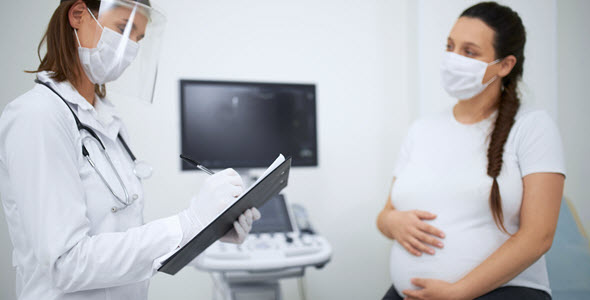By the bioMérieux Connection Editors
February is International Prenatal Infection Prevention Month, which aims to raise awareness of infections that can be transmitted from mother to baby during pregnancy (transplacentally) or in delivery (peripartum). Prenatal infections can have a tremendous negative effect on fetal and neonatal health, including serious illness, birth defects, lifelong disability, and even miscarriage or stillbirth.
Screening for common infections is the first step in accessing the care and treatment that may be needed to prevent transplacental or peripartum infection transmission. The CDC recommends that all pregnant women get tested for Human Immunodeficiency Virus (HIV), hepatitis B virus (HBV), hepatitis C virus (HCV), and syphilis. In addition, it is critical to be screened for Group B Strep, an otherwise harmless bacteria that 25% of women carry that can be dangerous when passed to a newborn.
Screening for HIV, HBV, HCV, and Syphilis
Raising awareness of the importance of screening and routine healthcare visits during pregnancy is imperative in reducing transmission of HIV, HBV, HCV, and syphilis. According to the CDC, women who receive late or no prenatal care are less likely to be screened and treated for these dangerous infections.
If HIV, HBV, or syphilis are detected in the mother during pregnancy, anti-infectives can be administered to the mother or infant to prevent maternal transmission to the newborn. While there is no treatment available to prevent HCV transmission, screening during pregnancy can inform delivery management issues that may reduce the risk of transmission.
Screening for Group B Strep
Group B Strep are normal bacteria that usually don’t have symptoms or side effects. During pregnancy, however, it is important to be conscious of the bacteria, because they can cause a late miscarriage, stillbirth, or long-term mental and physical issues in a newborn. Additionally, Group B Strep is the number one cause of meningitis and sepsis during the first week of life—dangerous conditions for a baby’s first few days.
It is usually recommended to be screened for Group B Strep at around 35 to 37 weeks, as it will indicate if a woman is carrying the bacteria within the following five weeks, when she is most likely to go into labor. If a positive result is returned, antibiotics will be administered from the beginning of labor to delivery.
Additional Considerations for Preventing Prenatal Infections
Screening for the aforementioned infectious diseases is essential—it is always better to be proactive rather than reactive when possible. Other proactive measures that can be taken during pregnancy include washing hands frequently, receiving recommended vaccines, avoiding people with infections, and reducing contact with infectious agents such as unpasteurized milk products, dirty cat litter, and rodents.
The COVID-19 pandemic has presented a disruption in the healthcare system—an April 2020 report found that nearly a third of Americans put off receiving medical care because they were concerned about contracting the virus. The CDC recommends keeping all healthcare appointments during and after pregnancy and suggests talking to a healthcare provider about steps they are taking to separate healthy patients from those who may be sick.
Prenatal healthcare visits and screening for common infectious diseases are vital in ensuring the health of mothers and babies. In support of International Prenatal Infection Prevention Month, use the resources below to join bioMérieux Connection in raising awareness of the importance of screening!
CDC Screening Recommendations Fact Sheet →
CDC ‘Preventing Group B Strep’ Webpage →
Opinions expressed in this article are not necessarily those of bioMérieux, Inc.



